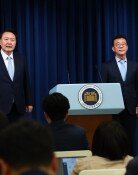Can Seoul persuade China to put pressure on Pyongyang?
Can Seoul persuade China to put pressure on Pyongyang?
Posted January. 14, 2016 13:49,
At a New Year`s news conference on Wednesday, President Park Geun-hye answered a question on the U.S. Forces Korea`s plan to deploy the Terminal High Altitude Area Defense (THAAD) system in South Korea by saying that Seoul will review the issue " from the perspective of national security and interests" in consideration of North Korea`s nuclear or missile threats. Regarding the U.S. deployment of tactical nuclear weapons in South Korea, she drew a clear line, noting that she did not consider it necessary
China should create an environment in which the THAAD deployment is unnecessary by putting pressure on North Korea to abandon its nuclear program, before protesting the THAAD deployment, which Beijing claims would be aimed at China. In a sense, the THAAD deployment in South Korea is inevitable because Seoul cannot cope with Pyongyang`s nuclear and missile threats with the current Patriot and Kill Chain missile defense systems. It is time that Seoul and Washington publicly discuss the THAAD deployment issue, which has been kept in a low profile so far.
President Park has also vowed to make all diplomatic efforts to ensure that the U.N. Security Council can adopt a resolution on the most powerful sanctions on North Korea in order to change the North`s attitude, stressing China`s role in the process. However, she has not been able to have even a telephone conversation with Chinese President Xi Jinping over one week after the North`s nuclear test. We hope that the Chinese leader takes seriously President Park`s remark that "holding the hands of those in need is (the role of) best partners." She also said, "I believe China will play a necessary role as a permanent member of the U.N. Security Council."
U.S. President Barack Obama also delivered the final State of the Union address in his term in office at a similar time to Park`s news conference. Despite high expectations of sending a serious message to the North, Obama no mention of North Korea, simply saying, "No nation dares to attack us or our allies because they know that`s the path to ruin." No direction mention of the North is seen as Washington`s intention to completely ignore the North. For Pyongyang, a taciturn warning could be more unsettling. However, some speculate that Obama`s failure to mention the North Korean nuclear issue for third consecutive State of the Union address suggest the issue has been pushed to the back burner in the U.S. policy priority.
President Park`s clear statement that even the U.S. was not aware in advance of the North`s nuclear test could become controversial, as she disclosed holes in the U.S. surveillance of the communist state. Even if Washington provides Seoul with a nuclear umbrella, it would not be able to launch a pre-emptive strike and could only react afterwards. The U.S. failure to detect the North`s nuclear test would not exempt South Korea`s National Intelligence Service and military authorities from their incompetence. They were in the dark until the North actually conducted a nuclear test on January 6, even though North Korean leader Kim Jong Un gave an order on December 15 last year. The Ministry of Foreign Affairs should also be held responsible for having failed to get Seoul`s position reflected in the State of the Union address of its most important ally.
South Korea should drive the situation in the direction of leaving the North with no choice but to give up its nuclear program by closely cooperating with the U.S. and Japan and persuading China and Russia. On Wednesday, a North Korean drone briefly infiltrated the border with South Korea before returning home upon the South Korean military`s warning shots. It is encouraging to see more than 1,000 South Korean troops applying for a postponement of their scheduled discharge in order to help defense the nation.






